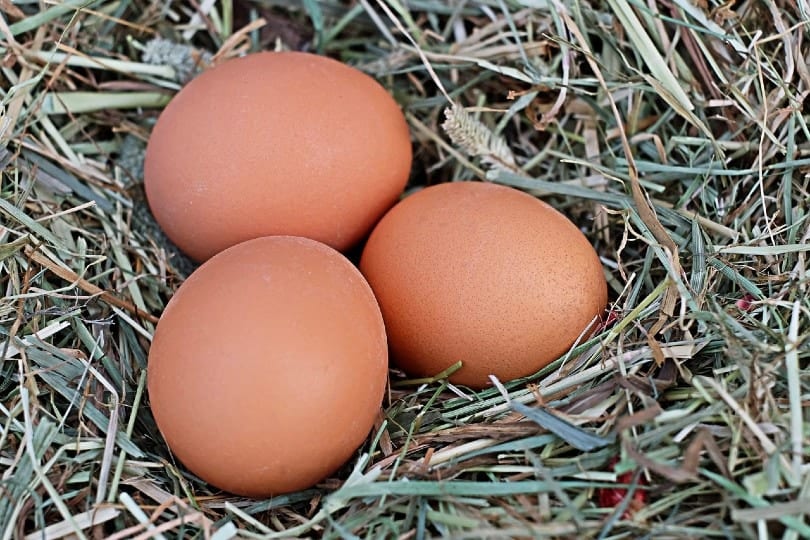In general, keeping backyard chickens can provide you with a great source of fresh and safe eggs. Be aware that even healthy chickens can carry Salmonella and E.coli, which can contaminate your collected eggs.
It’s best not to wash collected eggs fresh from the barn until you are ready to eat them, as doing so removes the protective bacterial layer called the “bloom” and exposes the semipermeable layer of the eggshell to harmful bacteria in the air.
So, to keep your eggs safe to eat, you should take steps to keep them as clean as possible from the moment they come out of your chicken until they make it to your plate. Anyone who lives with animals knows that keeping their spaces clean is no simple feat.
We’ve compiled our best tips to help you get consistently clean eggs from your backyard chickens!

The 10 Tips For Clean Eggs From Your Backyard Chickens
1. Use Soft Nesting Material
Providing lovely soft material in your chicken’s nesting boxing will first and foremost provide them with a nice clean place to lay their eggs. Without this cozy spot, a chicken will look to lay her eggs in any old place of her choosing, and often these spots are less than hygienic!
In addition, a soft nesting material will cradle any laid eggs so that they are less prone to breakage. Too little nesting material can become compacted and hard and cause breakage in eggs, making a messy space for any other eggs to stay clean.
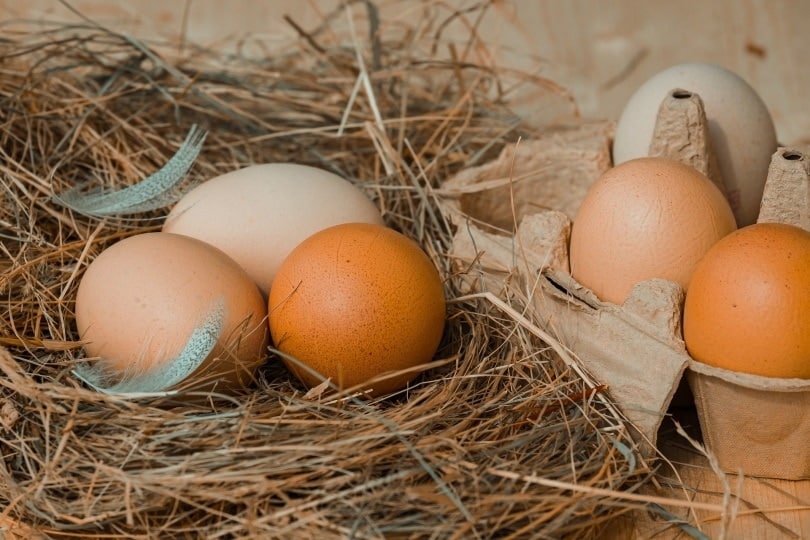
2. Fluff the Nest Daily
Fluffing the nest is the chicken version of making the bed. Over time a chicken using the same nesting space over and over will cause compaction of the nesting material and create a hard space that may increase the risk of egg breakage.
In addition, fluffing the nesting material can keep bedding fresh and clean between changes. It will allow air flow to reduce mold growth and harboring of parasites such as mites and lice.
3. Don’t Let Broody Hens Sit
If your eggs are exclusively for eating and not for hatching, you want to make sure chickens do not become clucky and attempt to sit on them for incubation. A broody hen will with all day and all night long, meaning she will likely do her business in the nest and quickly contaminate eggs with her fecal matter.
Collect eggs often to reduce the likelihood of getting a clucky chicken and remove any chickens who try to sit on any eggs.
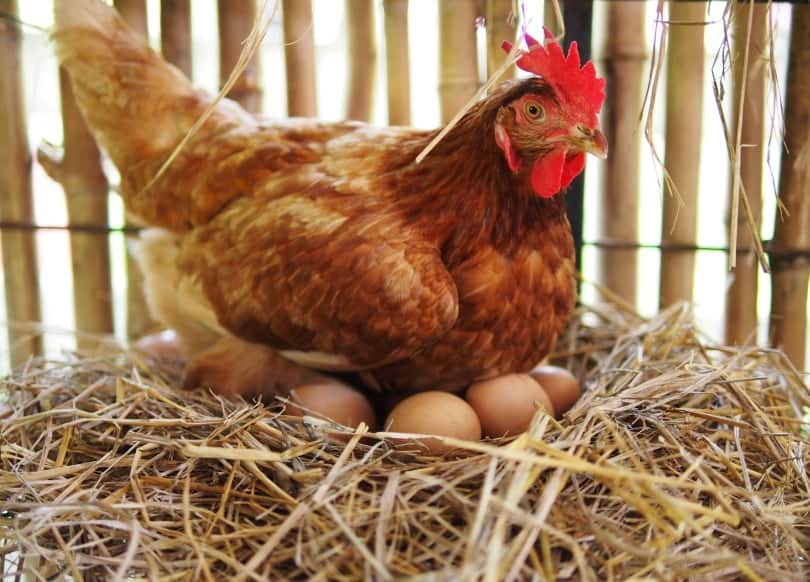
4. Keep Chickens Off the Nest During the Day
The nesting area should not be a regular place for your chickens to hang out. They should visit the nesting boxes simply to drop off their eggs and leave again. Try to discourage them from spending time there during the day and especially not sleeping on the nests overnight.
The less time they spend on and around the nest, the less soiling will occur so eggs can stay as clean as possible.
5. Consider Your Nesting Box Placement
Your chicken’s nesting boxes should be tucked away from the regular chicken thoroughfare. They should be slightly elevated from the dirty ground and kept away from favorite perching areas. This will keep the nesting area a sacred and clean place, rather than just another place to collect poop and dirt.
Also, a nesting area close to the run may find it gets full of dirt, mud, and all sorts of mess. Placing your nesting boxes far away from the coop entry will mean chickens will rid their feet of as much mess as possible as they come in from outside.
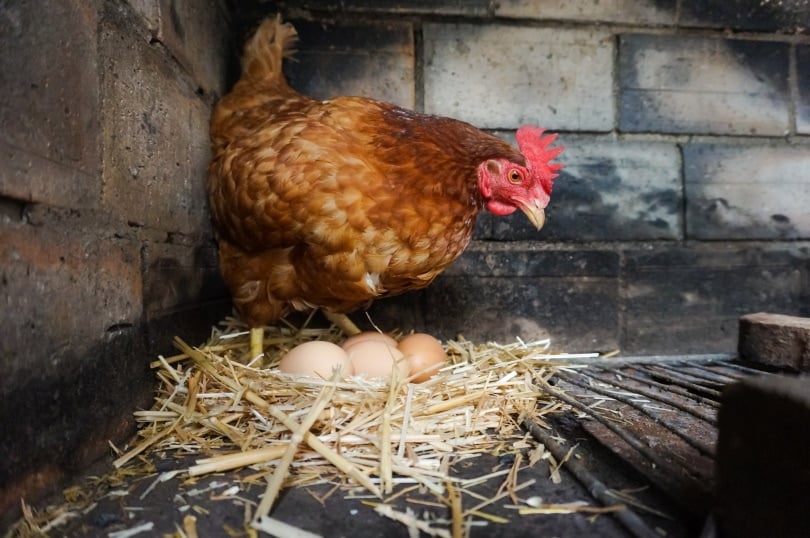
6. Check Vents
If the nesting boxes are clean, dirty eggs may arise from a chicken with an unclean vent. The vent, or cloaca, is the orifice that passes feces, urine, and eggs and acts as the reproductive organ.
If the vent becomes unclean with feces, passing eggs can become dirty before touching the nest. Healthy chickens should have clean vents. A dirty vent can indicate that there is some digestive issue or issue with passing feces. More investigation is needed if your chicken has a dirty vent. Speak to a veterinarian if you are worried.
7. Collect Eggs Early and Often
The best way to keep eggs clean is to remove them immediately. Of course, we all have many things to do in the day beyond consistently checking our chicken’s nestbox! Most chickens will lay their eggs early, so an egg collection as part of your morning routine is ideal. Also, have a quick check at the end of the day to catch any extra eggs.
For those who own a lot of chickens or frequently go away for a few days at a time, you might consider a “roll-away” nest box that is positioned on an angle that rolls laid eggs away to a clean, secure place so they can’t be soiled.
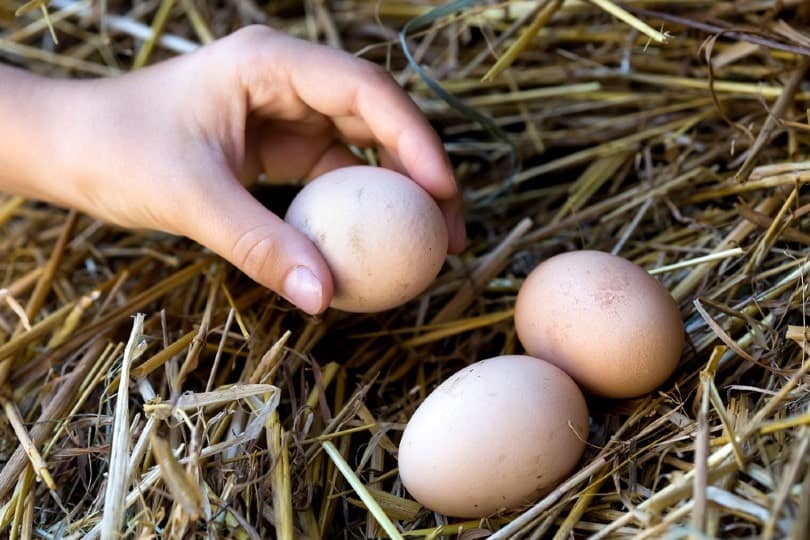
8. Move New Chicks Out of the Nestbox
If you are hatching some new babies in your coop, one of your nest boxes will be taken up from a mother hen and her incubating eggs. A mother hen won’t perch overnight like the other hens. She will stay on her nest, and once her chicks hatch, she will sit on them to keep them warm overnight.
If she stays sitting in the nesting area with her new babies, she will leave behind lots of fecal mess that will contaminate other eggs in the nesting boxes. Once your new babies hatch, move them to a new separate area with their mother to keep the nests clean.
9. Provide Enough Nestboxes
Chickens do not need an individual nesting box. However, they do need enough that there is space for multiple chickens to be laying at once. The general rule for chicken keepers is at least one free nesting box per four chickens.
If you don’t have enough nesting boxes, or you have broody hens hogging vital nesting space, you may find squabbles break out between chickens over nesting space. This fighting can easily cause egg breakage and make a mess of other eggs in the nest.
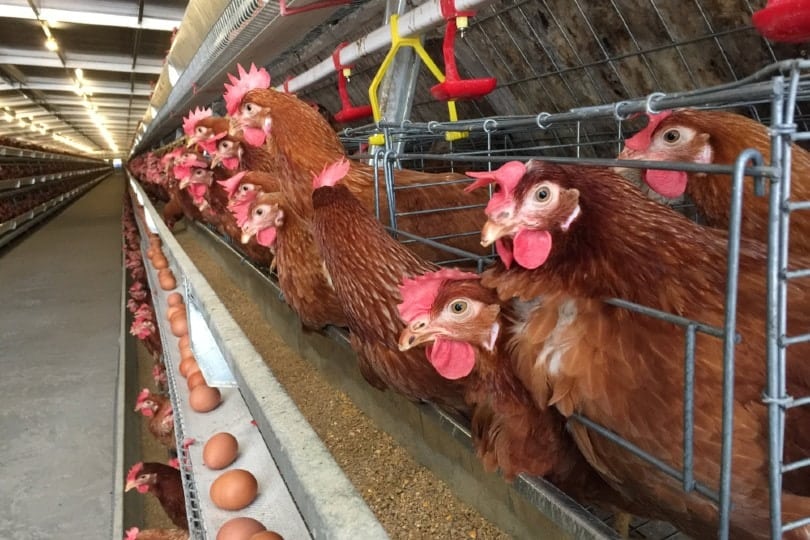
10. Have Lots of Roosting Perches
Chickens should not sleep in nesting boxes. Naturally, they find a high place to roost at night. Part of a functional coop should have plenty of space for all your chickens to happily perch up together at night.
If there is not enough space or perching is not suitable, you may find chickens bunkering down in the nests to sleep overnight and making a mess of the laying space in the process.

Final Thoughts
Eggs from your backyard chickens should not need washing when you first collect them! A normal egg should come out lovely and clean and to keep it this way you must make sure your coop set-up and your general husbandry is spot on.
Small mistakes can mean your precious eggs become soiled from fecal matter, mud, or broken eggs. There’s no need to worry because there is often an easy solution to these issues, follow our top tips to have every egg you collect come out beautiful and clean!
Featured Image Credit: Couleur, Pixabay
